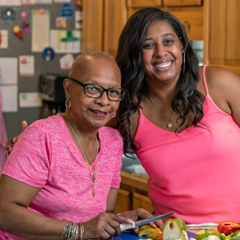Enjoy Patient Stories
Real-life stories from our patients bring Premier Health’s caring and capabilities to life. Learn more about some of the people who have benefited from our team’s knowledge and compassion. We’re proud to make a difference!
Deborah Raglin and Meka McCullough

One conversation with Deborah Raglin and her daughter, Meka McCullough, and it’s clear: these women are strong. Their resilience runs deep. Good thing, because over the last 20 years, they’ve needed it.
In 2002, Deborah was diagnosed with breast cancer at age 50. The recommended treatment took her right breast, all her hair, and her sense of smell. But it didn’t take her spirit. She credits a positive attitude — and the support of her husband, family, and friends — with getting her through. In spite of her rigorous treatment, Deborah didn’t miss a single day of work as a supervisor in General Motor’s occupational health department. “I got a little nauseated and tired, but I managed,” she says matter-of-factly.
Nine years later, her cancer returned; again,
In 2020, it was daughter Meka’s turn. Because Meka knew she was at high risk for developing breast cancer, she had started getting mammograms at a young age. “Sometimes the doctors would see something and get concerned,” she
says. “Over the years, I had several ultrasounds and
Daughter Myiah was unable to join her mom for treatment like she did for her grandma. “Because of COVID, Myiah had to sit in the car during my surgery and treatments,” Meka says. She credits her tough mental attitude and the support she felt (even if she couldn’t witness it face to face) for getting her through. “Plus, Miami Valley Hospital North’s radiation team actually made it fun,” Meka recalls.
Resilience runs deep in this family. Deborah has four cousins who also have survived breast cancer. Two of them also survived cervical cancer. And when Deborah’s mom was young, she had tuberculosis and lost a lung “but she kept right on going,” says Deborah.
Can Resilience Actually Make a Difference?
A good support system and a great attitude really can make a difference, says Thomas Heck, MD, an MD Anderson Cancer Network ®-certified physician, who cared for both women during all three cancer journeys. “It doesn’t just make a difference psychologically; studies have shown that overall, outcomes are better in breast cancer patients who have a good support system and a positive attitude.”
Advances In Detection And Treatment
In his 38 years of caring for cancer patients (the last 15 limited to breast cancer patients), Dr. Heck says detection and treatment has changed significantly. “Imaging has become much more sophisticated; 3D mammograms are able to pick up things we didn’t see years ago. And breast ultrasounds also have improved significantly, especially for women with dense breast tissue,” explains Dr. Heck.
New treatments also have emerged. “Multiple new studies now show that a lumpectomy is as effective as a mastectomy,” says Dr. Heck. “Meka is one example of that,” he says. “But there are cases where a lumpectomy may not be the best option.” New studies also point to removing fewer lymph nodes than in the past, which reduces the chance of lymphedema developing.
In addition to chemotherapy and hormone therapy, newer treatments now are available that attack breast cancer cells without harming normal cells. Called “targeted therapy,” Dr. Heck says they can be more effective with less severe side effects than traditional therapies.
All Treatment Options Considered
Dr. Heck and his colleagues know that every patient is different, even mothers and daughters. That’s the reason for Premier Health’s tumor board conferences. At weekly meetings, breast cancer specialists — including pathologists, surgeons, oncologists, radiologists, and nurse navigators — share their knowledge and weigh in on the care plan for each individual patient. “Every attendee gives his or her recommendation for each case,” says Dr. Heck. “This ensures that every treatment option is considered before we make a recommendation to the patient.”
Support To Count On
Meka's sisters haven't had a turn with breast cancer. But they know it's important to be screened regularly because their risk is higher. So far, so good. If they do develop breast cancer someday, they can count on their family's resilience, support from family and friends, and Premier Health’s breast cancer specialists to pull them through.
Schedule your mammogram or call (855) 887-7364(855) 887-7364 Monday through Thursday, 7:30 a.m. to 7 p.m., or Friday, 7:30 a.m. to 6 p.m.
Breast Health Resources For You
- Women without insurance coverage may be eligible for a free mammogram or other women’s health services. Call (866) 838-8973 (866) 838-8973to see if you qualify.
- Premier Health’s Cancer Prevention Program can help to determine your personal cancer risk due to family history or genetics.
- Acquisition
- Acute Care
- Breast Cancer
- Convenience Seeker
- Critical Fixer
- Fit Searcher
- Patient Story
- Wellness
- Wellness/Recovery
Contact Us
Call the Premier Health cancer hotline at (844) 316-HOPE(844) 316-4673 (4673), Monday through Friday, 8 a.m. to 5 p.m., to connect with a Premier Health cancer navigator.

